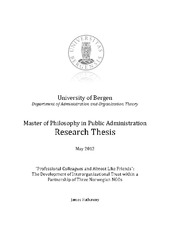"Professional Colleagues and Almost Like Friends": The development of interorganizational trust within a partnership of three Norwegian NGOs
Master thesis
Permanent lenke
https://hdl.handle.net/1956/6060Utgivelsesdato
2012-05-16Metadata
Vis full innførselSamlinger
- Department of Government [457]
Sammendrag
This case study examines the development of interorganizational trust within a partnership of three Norwegian nongovernmental organizations (NGOs) that formed a vocational school in Norway. Building on previous research, this study considers interorganizational trust to be constituted by the trust held by key individuals within the partnership - the boundary spanners. Furthermore, it categorizes the boundary spanners into three groups: the operational-level, strategic-level, and the board members. This study views the trust held by boundary spanners as a spectrum, in which there are various forms or levels of trust that can be held, and it uses two separate models of trust to examine the trust: one in which trust is developed in the context of a shared interpersonal history and the other in which trust is actually presumed before the relationship begins. The study set out to determine how interorganizational trust is developed among the different boundary-spanner groups, and it also set out to determine the impacts of interorganizational trust on the overall partnership. It found that trust was developed in different ways in different groups. Some groups based trust more on shared values and interpersonal history, while others based their trust on role categorizations or group membership. The boundary spanners saw several impacts that resulted from the interorganizational trust within the partnership: it created a positive work environment, where problems could be solved, and interorganizational trust was also considered a cornerstone" that allowed the partnership to keep moving forward even in the face of challenges.
